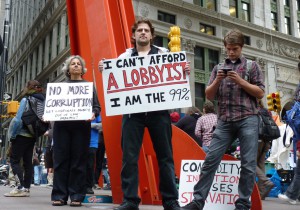Winning Progressive takes on some recent right-wing push-back and misdirection as the issue of income inequality gains resonance with the American public:
Showing how out of touch they are with everyday Americans, conservatives have latched
onto the news that the share of national income taken in by the top 1% fell from 23% in 2007 to “only” 17% in 2009 to contend that the focus of Occupy Wall Street and others on economic inequality is somehow misguided. For example, in a post titled “The 1% Ain’t What It Used To Be,” conservative blogger Megan McCardle responded that “we don’t want to spend years focused on income inequality, only to learn that the financial crisis fixed it for us.” Conservative economics professor Steven Kaplan of the University of Chicago business school echoed such doubts and actually offered a defense of inequality, stating in the New York Times that:
“It’s very interesting that [inequality] has become such a big topic now when the numbers are back to where they were in the 1990s,” said Steven Kaplan, an economist at the University of Chicago’s business school. “People didn’t seem to be complaining about it then.”
Pointing to the recent declines at the top, Mr. Kaplan argues the Occupy protesters have accused the wrong villain by focusing on inequality, which he called an inevitable byproduct of growth. “If you want to reduce inequality, all you need to do is put the economy in a recession,” he said. “If you want the economy to do well, as all of us do, then you’ll get more inequality.”Kaplan’s effort to link growth and economic inequality as inherently related is historically incorrect. For example, from 1950 to 1980, the share of income taken by the top 1% remained below 12% in all but one year, and was below 10% in 13 of those years. During that same time period, the US economy experience virtually uninterrupted growth. When the economy dipped in the early 1980s, the share of income taken by the top 1% increased. While it is true that most recessions lead to a decline in the share of income for the top 1%, the historical record does not support the contention that economic inequality is the inevitable byproduct of growth. In addition, while some level of inequality may be necessary for economic growth, elevated levels of inequality – such as those in the US today - actually stunt economic growth.

